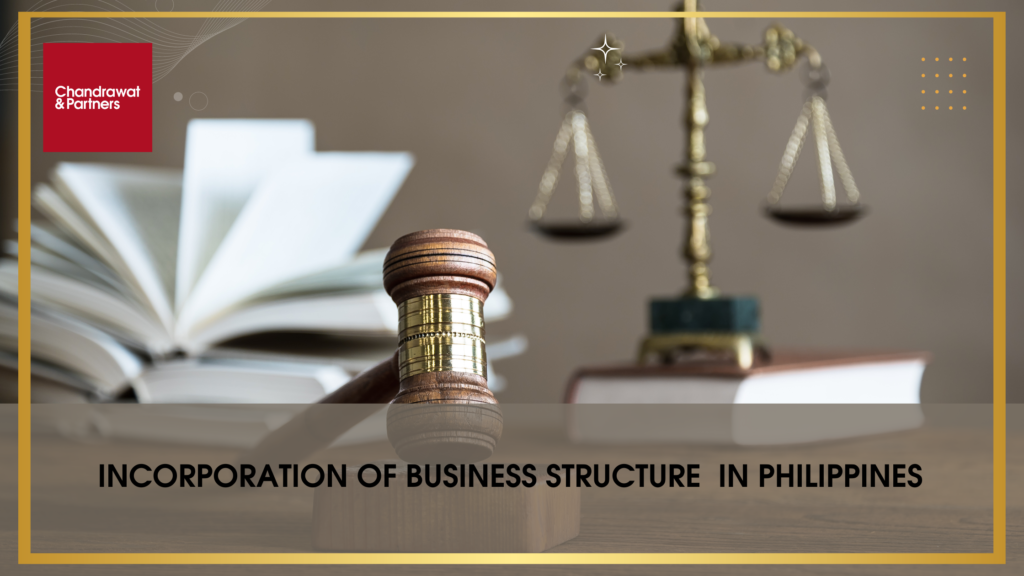
May 22 , 2024
INCORPORATION OF BUSINESS STRUCTURE IN PHILIPPINES
The “Philippines” offers a dynamic business environment with both promising opportunities and challenges to consider. The Philippines has a growing economy, increasingly attractive to foreign investors. The Philippines has a large, young population with a strong educational base, providing a readily available talent pool. The Philippine government offers various incentives and programs to attract and support businesses, particularly in priority sectors like manufacturing, tourism, and information technology (IT). The Philippines is generally open to foreign investment, with few restrictions on foreign ownership for corporations. This makes it easier for foreign companies to establish a presence in the country. The Philippines’ geographical location in Southeast Asia makes it a strategic hub for trade and investment, with easy access to regional markets.
FACTORS INFLUENCING CHOICE OF BUSINESS STRUCTURE
Choosing the right business structure is a crucial decision that can impact business in various ways. Factors to be considered while selecting the business structure are:
LIABILITY PROTECTION: Entrepreneur must check legal responsibility to be fulfilled and willing to accept when choosing a business structure. A corporation, for example, provides stronger protections for the owners, unlike the any other business structure.
FUNDING: Capital requirement in a business structure plays a significant role as it impacts the business operations. Entrepreneurs must check the funds they are willing to invest.
TAXATION: Entrepreneur must check the tax regime of business and the taxes that are to be paid while incorporating the business structure.
COMPLEXITY AND REGULATION: Complexity and regulation from simple to complex depends on choice of business structure. Corporation is the most complex structure with stricter regulations regarding board meetings, record-keeping, and filings.
INCORPORATION OF FOREIGN COMPANY IN PHILIPPINES
The Philippines offers opportunities for foreign companies to establish a presence and operate. While foreign companies cannot directly incorporate in Philippines, there are two main ways they can establish a presence and operate by incorporating branch office or subsidiary corporation:
- Branch Office: Branch office is an expansion, with some operational autonomy, of the foreign corporation itself. After fulfilling certain conditions, obtaining a License to Operate from the Securities and Exchange Commission (“SEC”) is necessary. In comparison to a subsidiary, it is quicker and easier to establish. Furthermore, there is no minimum capital need.
- Subsidiary Corporation: Subsidiary corporation is a separate legal entity established in Philippines, owned by the foreign company (parent company). It requires full incorporation procedures like a local company, including filing Articles of Incorporation (“AoI”), securing clearances, and registering with relevant government agencies.
PROCEDURE OF INCORPORATION OF FOREIGN COMPANY
The Philippines offers opportunities for foreign companies to establish a presence and operate in business environment.
BRANCH OFFICE
Requirements to be fulfilled by the entrepreneur,
- License to Operate application with the SEC
- SEC Certified true copies of the foreign company’s Articles of Incorporation and bylaws
- Audited financial statements for the past two years
- Board resolution authorizing the establishment of a branch in Philippines.
- Appointment of a resident agent with government authority to represent the branch
Process of Incorporation:
- Prepare the necessary documents, ensuring they are properly notarized and authenticated in the country of origin,
- Submit the application to the SEC, along with the corresponding filing fees. The SEC will review the application and may request additional documents or clarifications.
- Once approved, the SEC will issue a License to Operate, allowing the branch to commence operations in the Philippines.
SUBSIDIARY CORPORATION
Requirements to be fulfilled by the entrepreneur
- AoI which outlines the company’s purpose, capital stock, and management structure.
- Minimum capital stock payment (amount varies depending on specific factors).
- Treasurer’s Affidavit verifying the capital contribution.
- Clearances from relevant government agencies depending on the industry.
- Registration with the Bureau of Internal Revenue (”BIR”) and other tax authorities.
- Business permits and licenses from local government units.
Process of incorporation:
- Choose a company name and conduct a name availability and check with the SEC.
- Draft and finalize the AOI.
- Open a corporate bank account and deposit the minimum capital stock.
- Secure clearances from relevant agencies like the Department of Trade and Industry (DTI) and appropriate regulatory bodies.
- Register the corporation with the SEC and obtain a Certificate of Incorporation. Register with the BIR for tax purposes and secure necessary business permits and licenses.
KEY TAKEAWAYS
Foreign investors can find growth and development in their business through establishing foreign company by incorporating branch office or subsidiary corporation. With the business-friendly policies Philippines can give boost to the business. Business can be run smoothly while complying to the regulations and procedure set by the government and can be expanded in multiple aspects and better its performance.
HOW WE CAN HELP?
Professionals of our firm can help in establishing the business structure in Philippines in following ways:
- Experts from our firm can comply with the regulations made for the establishment of branch office or subsidiary corporation of foreign company.
- Our panel of experts can help in collection of required documents for the incorporation of the foreign companies.
- Important management consultation plays a necessary role in the foreign company incorporation. Our team can provide proper guidance regarding such compliance.
For more information or queries, please email us at
[email protected]
Key Contact

Surendra Singh Chandrawat
Managing Partner

